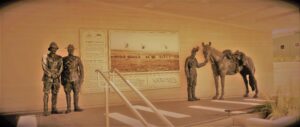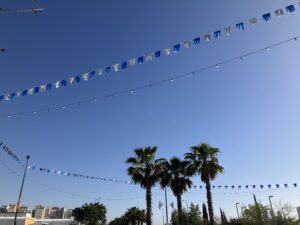The travels and troubles of the Jewish people are well known. But how much do you know about where they have been and what they have been through since the time of Jesus? The history of the people of Israel is fascinating with all manner of twists and turns that very few (non-Jewish) people know about. Some of them might be news to you…
Escape from Egypt
No other ancient people group have survived so long without a homeland, and to this day they still are closely bound with the Book that tells of their past and their future destiny. In Deuteronomy 26:5-10, God instructs his people to say this whenever they bring their offerings of firstfruits from the Land:
They were a people descended from nomads, who had escaped severe trials and suffering. And the story did not end after the exodus and the 40 years in the desert – the Bible is a catalogue of disasters and attacks from enemies, as well as expulsions from the land.
Banished to Babylon – again
Jesus correctly predicted that trouble was coming and that the temple would be destroyed – even so that not one stone would be left on top of another, and about 37 years after his death and resurrection, that is exactly what happened. The temple was burned, its precious contents carried off to Rome, and the Jewish people were expelled from their own capital city, Jerusalem. At that time Jewish people were largely banished from Israel entirely, although a few remained.
Many Jewish people migrated north and east, and a significant number set up camp once again in Babylon. Not long after the expulsion from Israel, Babylon became the most important centre of Judaism. The Talmud asks, “Why Babylon?” And the answer given was that in the same way that a wife who displeased her husband would be sent back to her father’s house, so Israel, the adulterous beloved of God, had been sent back to the place of her Father Abraham. Abraham, you might remember, was from Iraq, where Babylon is found.
Jewish people were scattered to many nations over the next centuries, and then during the seventh century, Mohammed had his encounter with an “angel of light”, which catapulted Islam into existence. Islam spread like wildfire, though peaceful means and by the sword. In the ninth century, 90% of the world’s Jewish population lived somewhat peaceably in a Muslim country[1]. Today this seems surprising, but back then, Muslims were very much more tolerant of Jewish people and their culture than the Christians were.
The Cross and the Crescent
With time, Jewish people ended up living more and more in Christian European countries where they could have had a chance to encounter the love, truth and power of the gospel. However, what they instead endured was extreme persecution and violence from those who claimed to represent the Messiah. A Jewish writer from the Middle Ages called Joseph Zarpharthi fled with his family from Germany to Turkey, and described the “Happy lot of the Jews under the Cresent as compared with their hard fate under the shadow of the Cross.”[2]
Almost everyone knows about the Holocaust, and many know about the pogroms in the East and the vicious Inquisition in the West… some know that European countries regularly expelled all Jewish people from their land – just for being Jewish.
At some points in history, the choice facing Jewish families was this:
a) Convert to Christianity
b) Get out of our country
c) Or we will kill you.
Of course, some chose the first option, as horrific as it seemed to them, just to save their lives. But this was not the Christianity, this was not the Good News, that Yeshua the Messiah came to deliver. This twisted monster has become an anathema to Jewish people even to this day.
Historian Shlomo Schecter wrote that in the sixteenth century many in the Jewish community had taken refuge in Muslim Turkey, and were longing to return to Israel and get right with God. He writes that as a result of all this suffering, there was a great sense of sinfulness and desire for repentance, and even willingness to be martyred for their love of God. But, he writes, “Turkey was perhaps at no time the country in which the crown of martyrdom could be easily gained. For this, one had to go to the lands of Christendom, where love was preached and murder acted.”[3] Back then, Muslims wouldn’t kill them for being Jewish, but Christians would.
And here is where it gets really sad…
In the sixteenth century, Jewish people started to trickle back to what was then Muslim ruled Palestine, under the (more friendly) Ottoman Empire. Much of the writings that form Jewish tradition today were collected, summarised, organised at this time, including the “Shulchan Aruch”. This is like a how-to guide with all the prayers, feasts and Jewish laws to help a family follow the Jewish tradition together. The man who wrote this, Joseph Karo, also wrote another book describing all his encounters with his “mentor-angel”. That’s right, Joseph Karo was also visited by an “angel” who constantly spoke to him and instructed him about what to do. Much of it seems good and godly, but this “angel” also forbade enjoying the Sabbath with meat and wine, no laughter was allowed, and he commanded Karo to follow Kabbalah – the mystical branch of Judaism which is very close to the occult. If the church had represented their Saviour more faithfully, would this have happened? We may never know. But it’s heartbreaking to see the way that Christian countries hounded God’s people out of their lands, into Muslim countries in order to be safe, and ultimately deeper into the enemy’s lies. Today, the Shulchan Aruch is still considered the ultimate guide to Jewish practice, and Christianity is still considered a dangerous, soul-destroying beast. How this must grieve us, who love Yeshua and his people, who know the beauty of the gospel and their desperate need for their Messiah.
But the story is not over yet!
Despite the damage that has been done in the name of Yeshua over the centuries, the Bible clearly teaches that the Jewish people will one day receive Yeshua en masse, saying “Blessed is He who comes in the name of the Lord!” Please pray for all those who love Yeshua around the world to share God’s heart and love for his people Israel, and that we would pray for them to receive the mercy that we have received in him. Let us change the record of history and be good witnesses, faithful intercessors, and loving brothers and sisters to the Jewish people.
[1] “The Geonim of the Babylonia and the Shaping of Medieval Jewish Culture, ” Robert Brody, Yale University Press, 1998, introduction
[2] “Safed in the Sixteenth Century: A City of Legists and Mystics.” In Studies in Judaism, second series, 202-328. Philadelphia: e Jewish Publication Society of America, 1908. p270
[3] ibid p 246
















